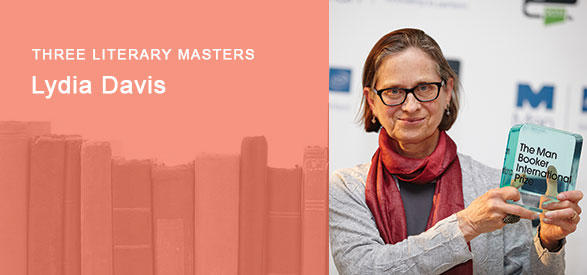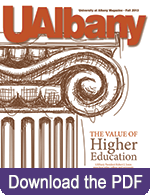
Lydia Davis
Painting With Words
By Paul Grondahl, M.A.'84
University at Albany professor and writer-in-residence Lydia Davis, who has published a chapbook of observations of three cows that graze across the road from her rural Rensselaer County house, is the 2013 winner of the Man Booker International Prize. The prestigious literary award, presented in London last May, carries a cash prize of £60,000 (roughly $91,000).
“She is a unique fiction writer who writes very short stories that are highly reflective, kind of ironic and sometimes comical. They play with the very concept of what storytelling is,” said Donald Faulkner, director of the New York State Writers Institute at UAlbany.
“This is a wonderful tribute and great recognition of a brilliant writer,” said fiction writer and UAlbany faculty member Lynne Tillman, who shares an office with Davis and teaches a fiction workshop with her. “She’s very observant of the world around her. I think of her as making paintings with words.”
Sir Christopher Ricks, chairman of the Booker Prize judges, said that Davis’ fictions “fling their lithe arms wide to embrace many a kind ... They have been called stories but could equally be miniatures, anecdotes, essays, jokes, parables, fables, texts, aphorisms or even apophthegms, prayers or simply observations.”
In the first sentence of “Cows,” Davis, 66, writes: “Each new day, when they come out from the far side of the barn, it is like the next act, or the start of an entirely new play.”
Davis, recipient of a 2003 MacArthur Fellowship, is also an acclaimed translator of classic works of French literature into English. She was named a Chevalier of the Order of Arts and Letters in France for her translations of Proust and Flaubert.
“She is an excellent editor, great teacher and sympathetic reader who has helped a lot of young writers,” Faulkner said. “She’s not a prima donna on any level.”
After she won the MacArthur grant, Davis chose to remain in the classroom. “I’ve realized I miss working with undergraduate students because they make me laugh and their writing can be very exciting and unexpected,” the Writers Institute Fellow told the Times Union in 2005.
- UAlbany Magazine
Fall 2013 - Cover Story
- Features
- Departments
- The Carillon
- Past Issues





